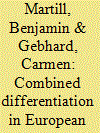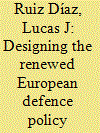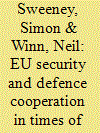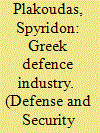|
|
|
Sort Order |
|
|
|
Items / Page
|
|
|
|
|
|
|
| Srl | Item |
| 1 |
ID:
190067


|
|
|
|
|
| Summary/Abstract |
Sustaining meaningful defense cooperation in Europe is made difficult by defense-industrial fragmentation, a multiplicity of institutional frameworks, divergent strategic cultures and domestic opposition to integration. The European Union’s recent foray into defense integration incorporates multiple forms of differentiation to overcome these barriers, with Permanent Structured Cooperation (PESCO) characterized by selective membership, external participation, and project-based clustering. Such “combined differentiation” offers an instructive example of how EU practices and principles can contribute to meaningful defense collaboration, even though Brussels is often thought a weak actor externally. It also illustrates how distinct forms of differentiation can be embodied within a single structure to accommodate complexity in strategic preferences. Using the example of PESCO, this article shows how “combined differentiation” has emerged as a response to the nature of the European defense landscape and how debates between member states about how to respond to specific challenges have brought about further differentiation over time.
|
|
|
|
|
|
|
|
|
|
|
|
|
|
|
|
| 2 |
ID:
178638


|
|
|
|
|
| Summary/Abstract |
As the COVID-19 crisis has evidenced, Europe is currently facing non-traditional, hybrid threats and challenges to its public order and security that question traditional, stand-alone responses. Conscious of this, during the last decade the European Union (EU) has developed several tools to deal with those security threats and challenges jointly by making full use of the Lisbon Treaty provisions. Indeed, in addition to the strengthening of the policies and instruments of the Area of Freedom, Security and Justice (AFSJ), the EU has particularly boosted European defence cooperation within the framework of the Common Foreign and Security Policy (CFSP) since 2016 through initiatives such as the Permanent Structured Cooperation (PeSCo). The aim of these defence initiatives is twofold: on the one hand, to complement AFSJ instruments to protect the EU homeland and its citizens; on the other, to enhance its response to international crises and contribute to international peace and security. A matter of future concern will be, nevertheless, to sustain the political momentum after the COVID-19 socioeconomic crisis and to show the positive externalities of enhancing defence cooperation in fighting non-traditional threats and challenges, notwithstanding the many difficulties that it will encounter in its uncertain path.
|
|
|
|
|
|
|
|
|
|
|
|
|
|
|
|
| 3 |
ID:
173160


|
|
|
|
|
| Summary/Abstract |
Has the United Kingdom(UK) Brexit referendum been a catalyst for more European Union security cooperation? How significant are post-referendum initiatives in security and defence? What are the implications of Brexit for European Union (EU) and UK security and defence? This article analyses EU post-Brexit strategic choices following the launch of the EU Global Strategy (2016). EU autonomy in security and defence requires close cooperation with third countries, including Norway and post-Brexit UK. It remains to be seen whether the EU and the UK can forge a new bespoke security and defence relationship that delivers mutual benefits through shared strategic ambitions, while also protecting their various interests. We suggest there will be serious collateral damage to UK-EU security and defence cooperation if post-Brexit trade negotiations descend into acrimony and mistrust, especially in the event of “no-deal” once the “transition period” ends. This would undermine European security and the EU’s quest for strategic autonomy in world affairs and have serious implications for both UK and EU security. We conclude that the EU needs to work with the UK on a plan to achieve global strategic autonomy, or both risk reduced influence in the wider world in the years ahead.
|
|
|
|
|
|
|
|
|
|
|
|
|
|
|
|
| 4 |
ID:
190068


|
|
|
|
|
| Summary/Abstract |
This article focuses on the use of experimental differentiation, a form of small-scale pilot program that aims at testing whether further institutional integration can be bolstered in an area where cooperation has not been tested or proven. Experimental differentiation consists of three features. Firstly, participation should not be constrained by membership in the European Union. Secondly, experimental differentiation should consist of short-term projects. Thirdly, the functional scope of such experiments should be clearly limited to reduce the expected political costs of participation. Empirically, this article focuses on the EU Battlegroups and analyzes how the above-mentioned features drove political actors to support participation. While EU Battlegroups have been criticized for their lack of effective action and the political and financial costs they entail, this article offers a more positive feature, arguing that Battlegroups should be seen as experiments that lead reluctant political actors to consider their cooperation under the EU framework.
|
|
|
|
|
|
|
|
|
|
|
|
|
|
|
|
| 5 |
ID:
190452


|
|
|
|
|
| Summary/Abstract |
Greece was never internationally renowned for its defence industry; in fact, its state-owned industries were usually a source of headaches rather than income for Athens. The Debt Crisis (2008-18) compounded the chronic ills of the Greek defence ecosystem which appeared to decline irreversibly. And yet, in recent years they rebounded and reached new heights. How can this surprising turnaround be explained? And what does it indicate for the future of the Greek defence industry? This paper aspires to examine how the Greek defence ecosystem (state- and private-owned) evolved from a stage of stagnation and decline into a phase of stabilisation.
|
|
|
|
|
|
|
|
|
|
|
|
|
|
|
|
| 6 |
ID:
174572


|
|
|
|
|
| Summary/Abstract |
Despite a growing “momentum” on European Union (EU) security and defence, there are no academic analyses that aim to systematically assess the role of the High Representative of the Union for Foreign Affairs and Security Policy and Vice President of the European Commission (HR/VP) in these strategic domains. This is surprising given that the HR/VP is one of the central actors in the complex institutional architecture of EU security and defence. To fill this gap in the scholarly literature and to contribute to a more fine-grained analysis of the two post-Lisbon Treaty HR/VPs, the article assesses Ashton and Mogherini’s mandates in these fields. This study is particularly relevant because the HR/VP’s hybrid institutional role may represent a unique analytical angle to investigate a formally intergovernmental sector, strongly shaped also by EU institutions’ authority over defence-industrial policy. Following these considerations, the article looks at how the two HR/VPs managed to navigate both the military and the defence-industrial dimensions of EU security and defence.
|
|
|
|
|
|
|
|
|
|
|
|
|
|
|
|
|
|
|
|
|